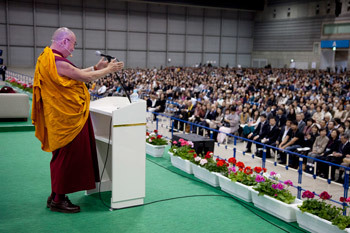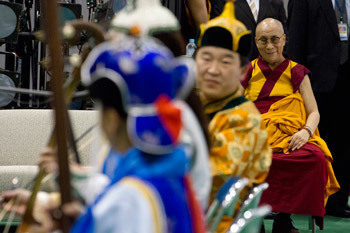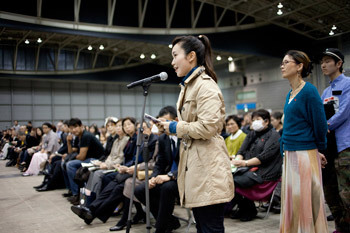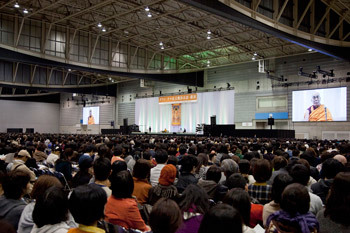Yokohoma, Japan, 4 November 2012 - On the first day of his first visit to Japan in 2012, His Holiness enjoyed a few brief audiences, then took a brief drive to the Pacifico Yokohama Exhibition Hall, in Yokohama, to deliver a talk on Geshe Langri’s “Eight Verses on Transforming the Mind” before more than 6000 people. It was a brilliant autumn Sunday in Japan, and as the almost capacity crowd sat still before him, His Holiness said that “Everyone has the right to achieve a happy and successful life”—as well as the capacity to do so—and went into a lucid and rigorous explanation of the different schools and emphases of Buddhism.

|
His Holiness the Dalai Lama speaking at the Pacifico Yokohama Exhibition Hall in Yokohama, Japan, on November 4, 2012. Photo/Office of Tibet Japan
|
All humans have the chance to eliminate afflictive emotions, he said, and so to end suffering, so long as we mix compassion with discernment, the Four Noble Truths with an understanding of emptiness. Then, turning to the text, and alighting on the words “May I” in the first stanza, he plunged into a powerful and spirited illumination of the meaning of “I” in Buddhism.
There is a self in Buddhism, he said, but it is entirely dependent on the mind and the body; for Buddhists, therefore, the self has no beginning since the body, matter, itself seems to have no beginning. And when you reflect on the contrast between the “self-cherishing mind” and the “others-cherishing mind,” you notice that much of our suffering comes from cherishing the self, much of our joy from cherishing others.
Compassion is not pity, though, His Holiness stressed, as he moved through the remaining seven verses, because pity connotes a sense of inferiority, where compassion stresses equality. We should move beyond thoughts of “like and dislike,” fame and praise.
*****
Clearly invigorated by the chance to talk about these serious Buddhist ideas, His Holiness suggested that, after all this food for the mind, the body needed sustenance, too, and broke for a quick lunch.

|
| His Holiness the Dalai Lama watching Mongolian musicians on stage at the Pacifico Yokohama Exhibition Hall in Yokohama, Japan, on November 4, 2012. Photo/Office of Tibet Japan |
Less than an hour later, he was back in the large hall, to watch a chanting of the Heart Sutra, first in Chinese and then in Korean, followed by a moving film chronicling his travels through Mongolia, accompanied by four richly-costumed Mongolian musicians on stage, and then a recitation of the Heart Sutra by four Tibetan monks and, at last, by a group of Japanese monks, stock-still in their gold-and-black Zen robes.
“We have to interact on the basis of just being humans,” he said at the beginning of his talk on nurturing the heart. “If, when I speak to you, I keep some notion that I am a Tibetan or a Buddhist, or even if I think it’s important to be a Dalai Lama, that attitude itself creates some kind of barrier. No use! We humans all have the same potential to attain a calm mind.” He went on to dissect the nature of self-created problems, our tendency to over-emphasize material values and power, even technology, our tendency to greed. “Those who have conducted scientific research are convinced that inner peace is the most important source of happiness.”
How find this inner peace? “The wise method,” His Holiness went on, “is to keep our intellectual faculties, keep sharpness of mind, without losing peace of mind.” We have, in short, to cleanse ourselves of destructive emotions through a training of the mind.
The minute His Holiness concluded his formal talk, three long lines formed, almost to the back of the huge hall, of people, mostly young and often from outside Japan, eager to ask questions.

|
| A young woman asking a question of His Holiness the Dalai Lama during his talk in Yokohama, Japan, on November 4, 2012. Photo/Office of Tibet Japan |
“Now is the time for scientists to take the lead,” His Holiness said at one point, in his answer to one of the first of more than 15 questions. “But everyone in his own field—teachers, doctors, even businessmen—can encourage inner values. And a businessman may find that if he works with moral principles, his business will be more successful.” Politicians, too.
Questioners came up to mikes near the stage to ask about the relation of neuroscience to spirituality, about loving with attachment and parenting and the environment and Tibet.
“Everything depends on education,” His Holiness said with vigor, rising to meet the often searching enquiries. “The existing educational system is very oriented towards material values. That’s not adequate. We must find out how to instill in the existing modern educational system equal weight on secular ethics, backed by science. They teach hygiene of the body in schools, but teaching about hygiene of the emotions is not yet developed.”
When a young Japanese man asked him about the anger he felt at official evasions about the Fukushima nuclear disaster, His Holiness said, “Such tragedies as Fukushima already happened. Too much worry, too much stress: no use! Instead of worry, look forward. The future is open. You can rebuild your home, your village, your community. If you have some interest in the Buddhist way of thinking, please read Shantideva’s book, especially the sixth chapter, instead of watching television. Instead of using “eye consciousness” or “ear consciousness,” use your mental powers. Think! Analyze! Then you can get more confidence.

|
Pacifico Yokohama Exhibition Hall where more than 6,000 people attended His Holiness the Dalai Lama's teaching and talk in Yokohama, Japan, on November 4, 2012.
Photo/Office of Tibet Japan |
“Frankly speaking, we should not be like animals. Animals, when something happens, respond by reflex. But we have this marvelous capacity to use the mind.”
Finally, addressing the issue of enmity, he carefully explained how “Only your enemy gives you the chance to practice tolerance and patience.” And the actor should never be confused with his action. “As soon as wrong actions are committed, sometimes you need counter-measures. But the actor, as a fellow sentient being, sometimes requires our compassion. For example, when we make a mistake, we make a distinction between “I” and that wrong action. Similarly, we can make a distinction between others and their wrong actions.” Just as we say, “It wasn’t me” when we did something wrong, we could say, “It wasn’t him.”
“So,” said His Holiness, “practicing forgiveness does not mean accepting wrongdoing.” We condemn the action, but never the person who committed it. That, perhaps, was one concrete, practical measure towards peace of mind, happiness and a true hygiene of the emotions.
















